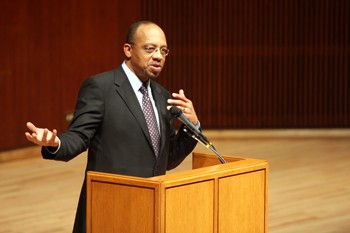
Eugene Robinson, associate editor and columnist for The Washington Post, spoke to students, faculty and staff about his experience covering the presidential election Thursday evening in Caruth Auditorium as part of the Sammons Lecture in Media Ethics. (Lindsey Perkins)
The real problem with the media’s coverage of the 2008 presidential campaign was not balance, but distractibility, according to The Washington Post associate editor and columnist and MSNBC contributor Eugene Robinson.
Robinson said it was the “undiagnosed Attention Deficit Disorder” of the coverage that was the biggest problem, and not the indication of a slight bias by the media towards now President-elect Barack Obama.
Robinson discussed the election at the ninth annual Sammons Lecture in Media Ethics on Thursday night. He discussed his point of view on the election, as well as criticism from others about media coverage during the campaigns.
In particular, Robinson discussed the research done by the Post’s ombudsman Deborah Howell.
Her calculations showed the Post was not fair in its coverage of the election. From June 4 to the election, Howell counted 32 positive columns for Obama in the OpEd section of the paper, while there were only 13 for Sen. John McCain. There were also 32 negative columns about Obama, with 58 negative columns about McCain.
In the news section, Howell calculated that there were 626 stories about Obama, with only 584 about McCain. Also, 311 photographs of Obama appeared compared to 282 of McCain.
While Robinson acknowledged the data indicated a slight bias, he would “argue that you can’t compare that apple to that orange.”
Obama was new, Robinson said, and the nation didn’t know as much about him as they did about McCain. In addition, Obama’s race was historically significant. Robinson argued that there were more articles about Obama “because there was more to explain.”
“I actually do not think balance was a problem,” he said.
The real problem for Robinson was how coverage of the two candidates shifted from the issues one day, and then “the next day we’re talking about lipstick on a pig.”
“If there was a real problem,” he said,” it was distractibility.”
He cited that there were 1,295 stories in the Post about the “horse race,” while there were only 594 stories about the actual issues. This two to one ratio, for Robinson, “speaks to this ADD.”
A major cause of this ADD is the 24 hours, 7 days a week news cycle. He suggested that cable news is the “newer, more pressing issue” because of the presence of outspoken bias of various anchors.
Robinson said analysis in the news shouldn’t be thought of as “the end of the world,” even though it wasn’t how he was taught to do the news.
“Opinion… is an ingredient that works particularly well in [cable news],” he said. “The proof is in the ratings.”
Robinson noted that cable TV is “a different medium; a new medium.”
“Maybe the highest and best use [of cable news] isn’t the same [as broadcast or print news],” he said. “Maybe there is a place for news delivered with attitude… as long as the different views cancel themselves out.”
A historically significant and personal election
Robinson said the toughest challenge he faced during his coverage of the election was “working through my own personal feelings.”
He called the election “the presidential campaign of my lifetime.” Robinson openly acknowledged that “it was very difficult not to be personally affected” by Obama’s campaign.
Robinson, an African-American, grew up in Orangeburg, South Carolina, and lived nearby the All Star Bowling Alley, where three students from the historically black South Carolina State University and Clafin College were shot and killed during a protest against segregation in 1968.
He described what it was like during those days, and he also went on to describe how affected he was by Obama. Two events stood out for Robinson: the Iowa caucus and Nov. 4.
In Iowa, Robinson said he was like a lot of African Americans: “I just didn’t know if white Americans would vote for a black man as president.”
But the thing that surpassed everything else happened last Tuesday night: Obama was elected president.
“Everything we had heard from exit polls indicated Obama [would win],” he said, saying he was never fully confident in the polls. “You never really know until it happens.”
Robinson said he called his mother and father from the MSNBC set when Obama was projected as the winner. He described it as “an amazing phone call.”
He doesn’t remember all that he said that night on air, but Robinson did recall talking about his children: “When I tell my two sons that ‘you can grow up to be anything,’ I’m telling the truth.”
Robinson questioned the part emotion played in the overall story, saying he personally couldn’t cover it without expressing some of what he was feeling.
He said this election probably was not the best “laboratory” in which to discuss the role of media.
“Maybe there was too much going on,” he said. “Maybe all we could do was the best we could.”









